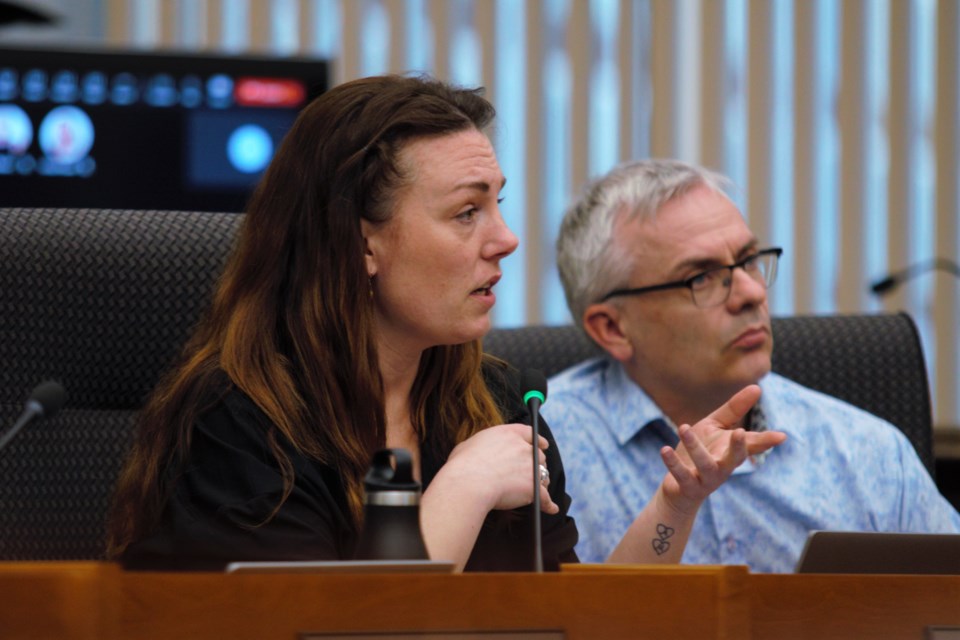THUNDER BAY – A move to examine city-owned properties including parkland and parking lots for housing development sparked some heated rhetoric at city council Monday over the possibility of cutting into neighbourhood parks.
Coun. Kasey Etreni, who called for the report on municipal lands available for development, defended her motion along with other supporters, who argued there was clearly no intent to sell off green space that's valued by the community.
Etreni’s motion will see administration report back by September with a list of city lands that could be declared surplus to the city’s needs and sold for housing development.
The at-large councillor says the move is intended to find opportunities for affordable housing in core areas, and help the city create more urban density and tax revenue.
Etreni has maintained she wants only parklands or parking lots that are not heavily used to be considered, saying some parks are “within minutes of other parks” and contain areas she believes are rarely utilized by the public.
“Let me be the first to say, I respect parks and green space – they’re both very important to me,” she said Monday. “But driving around the city and looking at maps, it's clear the city has an abundance of land, especially in the urban area, where infill is desired.”
“Many of these areas are open spaces [where we’re] just mowing the grass, without any formal trails or playground equipment, and we're spending tax dollars to maintain them.”
Etreni added she'd like to see the city attach conditions guaranteeing affordable housing is included in any development – a point echoed by other councillors.
“Since we own these lands, I hope we have the tools to ensure the development of the lands will result in more affordable and attainable housing, while balancing the concerns of the neighbourhood.”
Coun. Shelby Ch’ng said she was interested in seeing the list from administration, but also “a little nervous” about the possibilities it opens up.
“What recourse would we have from a big developer coming through, buying up these plots of land, and just sitting on them? Now we don’t even have access to mow the lawn there anymore.”
“Because I’d hate to have a fire sale on our city parks and then have it be purchased by the wealthy and create a greater divide in the city.”
Director of development services Joel DePeuter said the city sometimes puts such development conditions in place, but typically only with major properties considered strategically important to the city.
“I think there will be additional work that ought to be done through this process in terms of what properties are sufficiently important that development conditions should be put in place,” he said.
Coun. Andrew Foulds said while he'd come around to support much of Etreni’s motion, he couldn’t get behind developing parkland.
"I’ve sort of been convinced that if some parking lots, particularly in the downtowns, can be redeveloped into something else by the private sector, that’s a good thing," he said. "It perhaps gears parking towards our parkades, it certainly develops some tax revenue."
"Where I’m not comfortable supporting this resolution is the consideration of parkland."
Foulds moved an amendment to remove parkland from consideration, but that was defeated on an 8-5 vote. Couns. Agarwal, Aiello, Bentz, Etreni, Giertuga, Hamilton, Oliver, and Zussino voted against Foulds’ proposed amendment.
Mayor Ken Boshcoff supported the amendment, saying while Etreni’s motion was “timely and very positive,” selling parkland in a city defined by its relationship to nature would be a mistake.
“We know the inclusion of the word parkland is a red flag, and I’m afraid it may derail a very well-intended process,” he said. “Antagonizing people at this time is probably something we don’t need more grief on.”
Coun. Kristen Oliver suggested some of the rhetoric around parks was overheated.
“I don’t want to go into community fear-mongering that, 'There’s a park, we’re going to turn it into residential housing.' That’s not at all what I think the intent is that Coun. Etreni’s putting forward.”
“I understand we have properties that are not utilized, are [considered parkland, but] will likely never [be developed] into a park. So are we looking at every opportunity to harness those types of properties?”
Staff said the report will complement a housing land needs study already underway.
DePeuter also added that a previous exercise to consider disposing of some parkettes had met with "mixed success."
In an interview, DePeuter said council’s move to explore developing parkland and parking lots was unusual, but not unprecedented – some lesser-used parking lots have previously been sold for housing development.
“That parkland be sold, that is not very usual,” he said. “But I think there’s interest in looking at the inventory and seeing if there are spaces that are underutilized, or perhaps there’s adequate [alternatives].”
